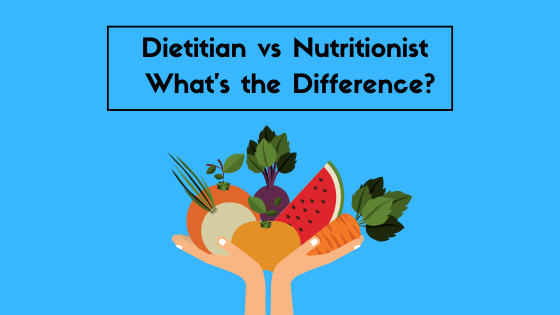Before diving into the differences, I want to make a disclaimer. There are awesome “nutritionists” practicing and there are not-so-great Registered Dietitians out there practicing. Just like chiropractors, doctors, lawyers, and any other credentialed profession, you go to school to learn the science, complete the requirements to obtain a degree, start practicing and figure out what works best for you and your clients.
All dietitians are nutritionists but not all nutritionists are dietitians. The terms dietitian and nutritionist are often mistaken for the same thing, but there are some major differences between the two. These differences are related to qualifications and legal restrictions.
It’s important to understand where you are getting your information from and if it is a reliable source.
Nutritionist is not a legally-backed term, meaning anyone can call themselves a nutritionist. We see this often when social media influencers or someone who lost a significant amount of weight start to advertise nutrition coaching.
While their intentions are great, the problem is that just because a specific way of eating worked on one person, doesn’t mean that it will work on the next.
The even bigger issue comes when we start talking about working with people who have medical conditions. If a nutritionist isn’t aware of food-drug interactions or how specific diets will affect a medical condition, they could do more harm than good.
There are some awesome nutrition coaches out there focusing on whole foods and empowering their communities to make health a way of life. There are also some great certifications out there teaching people the basics of nutrition coaching. I love it!
But just because you complete a 12-30 hour course or watch a movie, doesn’t mean you are qualified to provide nutrition coaching to the public.
Dietitians, on the other hand, are licensed professionals with a minimum of a bachelor’s degree in the science of nutrition. After finishing this degree, candidates must complete a minimum of 1,200-hour internship followed by taking a board exam.
After becoming licensed, Registered Dietitians must maintain their credentials by completing continuing education credits.
As a business owner, it’s important to understand who you are referring your clients to and what they are being told.
Just because someone is a Registered Dietitian doesn’t mean they shouldn’t go through a vetting process to ensure nutrition philosophies align. Once you have found someone who’s nutrition philosophies align with yours, it’s important that they are working within their scope of practice.
There are laws about nutrition coaching that vary by state to state. Some states require you to have the Registered Dietitian credentials to charge for nutrition services altogether, others require you to have the RD credentials to work with clients who have a medical condition. You can find out more about your state laws here.
Unfortunately, ignorance is not bliss. If you or one of your contractors in your business is practicing out of the scope by helping clients with nutrition, you can be subject to serious fines. I’m sure you heard of Heather Del Castillo, a CrossFit Trainer, who was forced to shut down her nutrition coaching business in Florida.
I have spoken with CrossFit gym owners over the years who have received letters from the Department of Health, as well as fines, for providing nutrition coaching in a state that has licensure laws similar to Florida.
What is in “the scope”?
You really should refer to your specific state laws to understand because it does vary by state. In most states, you can provide general nutrition recommendations. In states like Florida, according to the laws, you must be licensed or overseen by a licensed professional to charge for any nutrition services.
There are two things we recommend staying away from if you are not a licensed Registered Dietitian: providing customized meal plans for clients and medical nutrition therapy. Even when partnering with HSN Mentoring, these two things are out of the scope of the program.
At Healthy Steps Nutrition. our program was written by Registered Dietitians. Today, we have a team of Registered Dietitians overseeing the program and working with clients who have a medical condition making them unable to work with the nutrition coaches running the program.
What does this mean for you? When partnering with HSN Mentoring you can feel confident that you are providing your nutrition clients with science-backed information and are praciticing within the scope because the program is written and overseen by the nutrition experts.
Nicole Aucoin, MS, RD, LD/N
Founder, Healthy Steps Nutrition
Home of CrossFit HSN and HSN Mentoring
www.healthystepsnutrition.com
www.growyournutritionbusiness.com
FREE Help Related To
Building A Nutrition Program In A Gym
READ: How To Recoup Cost Of Your Initial Investment With HSN Mentoring In Under 30-Days HERE
LISTEN: How To Build A Nutrition Program Into A CrossFit Gym HERE
LISTEN: Nutrition Made Simple Podcast – CrossFit, Nutrition & Your Health HERE
HSN Mentoring Gym Owner Highlight: Meet Barry & Jocelyn, Owners Of CrossFit Generation, a 14-year affiliate owner HERE





